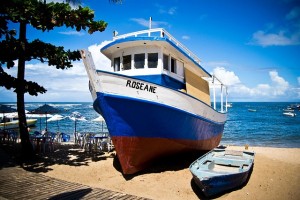to last, to take
[verb]
[du-ren, duur-de, ge-duurd] ![]()
 The verb ‘duren’ is used to indicate that an activity lasts a specific period of time, or that it is ongoing. It’s used in the same way as the English ‘to take’ or ‘to last’ (although ‘to last’ may indicate a more passive experience which is not explicitly clear when using ‘duren’).
The verb ‘duren’ is used to indicate that an activity lasts a specific period of time, or that it is ongoing. It’s used in the same way as the English ‘to take’ or ‘to last’ (although ‘to last’ may indicate a more passive experience which is not explicitly clear when using ‘duren’).
Examples:
– “Hoe lang duurt de film?”
(“How long does the film last?”)
– “Dit duurt mij te lang, ik kom wel een andere keer terug!”
(” (I think) this is taking too long, I’ll come back some other time!” Note that ‘mij’ in this case means ‘in my opinion’.”)
– “Hoe gaat het tussen jullie?” – “Goed! We hebben op het moment geen ruzie. Voor zolang als het duurt…”
(“How are things between the two of you?” – “Good! We are not fighting at the moment. We’ll see how long that lasts…” Note that ‘(voor) zolang als het duurt’ is typically used ironically.)
– “Kun je heel even wachten, het duurt niet lang!”
(“Would you mind waiting, this won’t take long!”)
– “Waarom duurt het altijd zo lang voordat je klaar bent om te vertrekken?”
(“Why does it always take so long before you are ready to leave?”)
– “Zolang de sollicitatieprocedure duurt, is er geen communicatie mogelijk over de voortgang.”
(“During the hiring process it is not possible to communicate on the progress.”)
– “Ik had vanochtend een vergadering en het duurde en duurde maar, ik dacht dat er geen einde aan kwam!”
(“This morning I had a meeting that dragged on forever, I thought it would never end!” The phrase to remember here is ‘Het duurde en duurde maar’.)
Expressions:
– “Dat/het zal mijn tijd wel duren”: that/it will last my time.
Example:
– “Ik ben benieuwd hoe de reorganisatie zal verlopen…” – “Ach, het zal mijn tijd wel duren, ik ga bijna met pensioen…”
(“I’ll be curious to see how the reorganization will go…” – “Oh well, it will last my time, I’ll retire soon…”).
Related words:
– Tijd: time [noun] [de tijd, de tijden].
– Duur: length (of time) [noun] [de duur, <no plural>].
– Periode: phase, period [noun] [de periode, de periodes].
– Wachten: to wait [verb] [wachtte, gewacht].
– Voortduren: to drag on, to endure, to persist [verb] [duurde voort, voortgeduurd].


 ‘Boot’ is the general word for ‘boat’. When you are looking for boots to wear, we call them ‘laarzen’. Bigger ships are called ‘schepen’ in Dutch, with singular form ‘schip’. It’s sometimes a bit unclear when a vessel is a ‘boot’ or a ‘schip’, in general smaller vessels are a ‘boot’. I’ve insulted sailors in the past by referring to their ‘schip’ as a ‘boot’.
‘Boot’ is the general word for ‘boat’. When you are looking for boots to wear, we call them ‘laarzen’. Bigger ships are called ‘schepen’ in Dutch, with singular form ‘schip’. It’s sometimes a bit unclear when a vessel is a ‘boot’ or a ‘schip’, in general smaller vessels are a ‘boot’. I’ve insulted sailors in the past by referring to their ‘schip’ as a ‘boot’. The adjective ‘onbekend’ has two general translations: ‘unknown’ and ‘unfamiliar / unacquainted (with)’. In case of the latter, it is also common to use ‘niet bekend’. The related noun is ‘onbekende’ the meaning of which changes depending on the article: ‘het onbekende’ is ‘the unknown’ and ‘de onbekende’ is ‘the stranger / the unknown person’.
The adjective ‘onbekend’ has two general translations: ‘unknown’ and ‘unfamiliar / unacquainted (with)’. In case of the latter, it is also common to use ‘niet bekend’. The related noun is ‘onbekende’ the meaning of which changes depending on the article: ‘het onbekende’ is ‘the unknown’ and ‘de onbekende’ is ‘the stranger / the unknown person’. ‘Pauze’ is the general word for a break or intermission. In sports however, half-time (or interval) is called ‘rust’. In case of the latter, one is actually resting, whereas ‘pauze’ does not necessarily imply that you deserve a rest 🙂
‘Pauze’ is the general word for a break or intermission. In sports however, half-time (or interval) is called ‘rust’. In case of the latter, one is actually resting, whereas ‘pauze’ does not necessarily imply that you deserve a rest 🙂